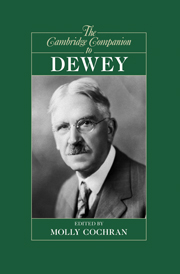Book contents
- Frontmatter
- Introduction
- 1 The making of a democratic philosopher: the intellectual development of John Dewey
- 2 Dewey’s epistemology
- 3 The naturalism of John Dewey
- 4 Dewey’s logic of inquiry
- 5 The primacy of practice in Dewey’s experimental empiricism
- 6 Cognitive science and Dewey’s theory of mind, thought, and language
- 7 John Dewey and action
- 8 Dewey’s moral philosophy
- 9 Ethics as moral inquiry: Dewey and the moral psychology of social reform
- 10 Dewey and pragmatic religious naturalism
- 11 Dewey’s aesthetics
- 12 Dewey’s philosophy of education: a critique from the perspective of care theory
- 13 Dewey’s vision of radical democracy
- 14 Dewey as an international thinker
- Bibliography
- Index
14 - Dewey as an international thinker
Published online by Cambridge University Press: 28 September 2010
- Frontmatter
- Introduction
- 1 The making of a democratic philosopher: the intellectual development of John Dewey
- 2 Dewey’s epistemology
- 3 The naturalism of John Dewey
- 4 Dewey’s logic of inquiry
- 5 The primacy of practice in Dewey’s experimental empiricism
- 6 Cognitive science and Dewey’s theory of mind, thought, and language
- 7 John Dewey and action
- 8 Dewey’s moral philosophy
- 9 Ethics as moral inquiry: Dewey and the moral psychology of social reform
- 10 Dewey and pragmatic religious naturalism
- 11 Dewey’s aesthetics
- 12 Dewey’s philosophy of education: a critique from the perspective of care theory
- 13 Dewey’s vision of radical democracy
- 14 Dewey as an international thinker
- Bibliography
- Index
Summary
George Herbert Mead wrote that the most important and distinguishing way in which American life shaped its philosophy was the freedom Americans had to “work out immediate politics and business with no reverential sense of a pre-existing social order within which they must take their place and whose values they must preserve”; he concluded that “[i]n the profoundest sense John Dewey is the philosopher of America.” Dewey, like Mead, believed that philosophy exhibits a national character. Dewey held that American philosophy was born out of the demands of democracy. For Dewey, this meant that it asked questions about how the individual should be conceived in relation to society and how each American might be actively engaged in the making of this new world. However, while Dewey is considered to be a uniquely American philosopher, he was also an international thinker. Indeed, his international political thought was a product of his American philosophy. In reading Dewey on the subject of international politics one cannot help but be struck, first, by how global his world was and, second, how actively engaged Dewey was with international politics. Dewey began writing on international themes as early as 1902 and during World War I incorporated into his philosophy an understanding of the world as being linked in complex webs of interdependent relationships brought on by industrialization.
- Type
- Chapter
- Information
- The Cambridge Companion to Dewey , pp. 309 - 336Publisher: Cambridge University PressPrint publication year: 2010
- 6
- Cited by

